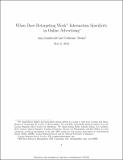When Does Retargeting Work? Information Specificity in Online Advertising
Author(s)
Lambrecht, Anja; Tucker, Catherine Elizabeth
DownloadTucker_When does.pdf (2.012Mb)
OPEN_ACCESS_POLICY
Open Access Policy
Creative Commons Attribution-Noncommercial-Share Alike
Terms of use
Metadata
Show full item recordAbstract
Firms can now offer personalized recommendations to consumers who return to their website, using consumers' previous browsing history on that website. In addition, online advertising has greatly improved in its use of external browsing data to target Internet ads. Dynamic retargeting integrates these two advances by using information from the browsing history on the firm's website to improve advertising content on external websites. When surfing the Internet, consumers who previously viewed products on the firm's website are shown ads with images of those same products. To examine whether this is more effective than simply showing generic brand ads, the authors use data from a field experiment conducted by an online travel firm. Surprisingly, the data suggest that dynamic retargeted ads are, on average, less effective than their generic equivalents. However, when consumers exhibit browsing behavior that suggests their product preferences have evolved (e.g., visiting review websites), dynamic retargeted ads no longer underperform. One explanation for this finding is that when consumers begin a product search, their preferences are initially construed at a high level. As a result, they respond best to higher-level product information. Only when they have narrowly construed preferences do they respond positively to ads that display detailed product information. This finding suggests that in evaluating how best to reach consumers through ads, managers should be aware of the multistage nature of consumers' decision processes and vary advertising content along these stages.
Date issued
2013-10Department
Sloan School of ManagementJournal
Journal of Marketing Research
Publisher
American Marketing Association
Citation
Lambrecht, Anja, and Catherine Tucker. “When Does Retargeting Work? Information Specificity in Online Advertising.” Journal of Marketing Research 50, no. 5 (October 2013): 561–576.
Version: Author's final manuscript
ISSN
0022-2437
1547-7193